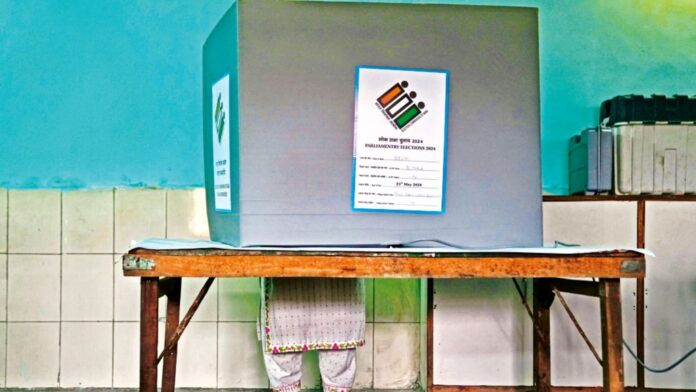NEW DELHI: While the Election Commission of India (ECI) is executing a Special Intensive Revision (SIR) of electoral rolls in Bihar ahead of the 2025 Assembly elections—marking the first such full-state revision in 22 years—the ECI has, in the recent past, carried out similar exercises to clean and verify the electoral rolls.
The ECI, as past records show, has deployed mechanisms for corrective voter list clean-ups. These operations—though not formally labelled as SIR—effectively served the same purpose: identifying and correcting anomalies in the electoral rolls.
As per data, the last time such a full-scale SIR was conducted in India was in 2003, also in Bihar. However, since then, the Commission has not invoked SIR at the state-wide level but has repeatedly relied on Special Summary Revisions (SSRs) and targeted verification drives in select districts, constituencies, and regions to address complaints of inflated rolls, fake voters, migration, or poor voter turnout.
Though the term “Special Intensive Revision” has remained mostly dormant in official circulars since 2003, the spirit of intensive scrutiny has never disappeared.
Unlike most Special Summary Revisions, which are often limited to targeted areas or sample verifications, the SIR mandates door-to-door verification of every elector across the state.
In Jammu and Kashmir during 2022 and 2023, following the abrogation of Article 370 and the delimitation of constituencies, the ECI conducted a large-scale voter list exercise as part of a Special Summary Revision. This included the addition of new voters, removal of duplicates, and the registration of displaced populations.
Similarly, in West Bengal between 2016 and 2018, after allegations of bogus voting in municipal elections, the Commission ordered house-to-house verification in districts such as Birbhum, Murshidabad, and North 24 Parganas.
Tamil Nadu saw a similar effort in 2015 and 2016 in cities like Chennai and Madurai, where physical verification and photograph comparisons were conducted.
In 2021, districts in Uttar Pradesh such as Meerut, Ghaziabad, and Prayagraj witnessed intensive verification ahead of the Assembly polls. Similarly, Punjab saw targeted checks in Ludhiana and Amritsar in 2016 and 2017, while Karnataka faced a voter list clean-up in more than 50 Assembly segments across Bengaluru prior to the 2014 general elections.
In Delhi, from 2008 to 2013, repeated micro-verification drives were carried out in slum clusters and unauthorised colonies, prompted in part by internal migration.
While Bihar’s full-scale Special Intensive Revision stands out, it forms part of a broader, ongoing national effort to maintain clean electoral rolls.
In July 2024, the Election Commission initiated Special Summary Revisions (SSRs) in Haryana, Jharkhand, Maharashtra, and Jammu & Kashmir, setting July 1 as the qualifying date and directing Booth Level Officers to conduct house-to-house updates ahead of Assembly elections there. Earlier, Goa completed its SSR between October 2024 and January 2025, including two special verification drives and rigorous claims and objections rounds. States like Assam, Delhi, Kerala, and Manipur also carried out similar SSR campaigns during 2024–25.
The current SIR in Bihar is being conducted under Rule 31 of the Registration of Electors Rules, 1960, with door-to-door verification of every elector.
The last such exercise in the state was in 2003, a period when concerns about voter list inflation and manipulation were high. What makes 2025 different is the scale and uniformity of the process across the entire state.
Significantly, the move comes close on the heels of the ECI’s decision to conduct special revisions even for five Assembly bypolls—an unusual step, given that such revisions are rarely undertaken for by-elections.
These were conducted in Kadi (SC) and Visavadar in Gujarat, Nilambur in Kerala, Ludhiana West in Punjab, and Kaliganj in West Bengal. The results of these bypolls reflected a dispersed political verdict.
The BJP won the Kadi seat, while the Aam Aadmi Party captured Visavadar. In Kerala, the Congress wrested Nilambur from the CPI(M), whereas in Punjab, AAP retained the Ludhiana West seat. Trinamool Congress held on to Kaliganj with a significant margin.
In a press conference held on July 3 at the AICC headquarters in New Delhi, the Congress party, led by Pawan Khera (Chairman, Media & Publicity), Rajesh Ram (President, Bihar PCC), and Krishna Allavaru (AICC In-charge, Bihar), alleged that the Election Commission’s Special Intensive Revision (SIR) process in Bihar is a calculated attempt to disenfranchise a large number of voters—specifically the poor, Dalits, OBCs, migrant workers, and the rural population.
They questioned the practicality of verifying around 8 crore voters within just 30 days during the monsoon season, especially when over 3 crore Bihari labourers have migrated out of the state for work.
Citing official records, they pointed out that only 2.28% of those born between 2001 and 2006 in Bihar have birth certificates, and in 2002, birth registration in the state was just 3.7%, compared to the national average of 56.2%. The Congress revealed that Election Commission officials allegedly stated that 20% of voters—nearly 1.6 crore to 2 crore people—are expected to be cut from the rolls.
They raised concerns that the process excludes commonly held IDs like Aadhaar, voter cards, and job cards, while demanding documents most do not possess. With over 4 lakh vacancies across 40 state departments and no clarity on who will conduct the ground-level verification, they warned that BJP workers may be used as booth-level officers, undermining the neutrality of the process.
It is expected that Bihar will go to polls with around 98,500 polling stations, a significant increase of about 20,600 new booths since the last elections.
It is important to note that the SIR in Bihar is taking place after the Nitish Kumar government released the caste survey findings in October 2023. The 2022 Bihar Caste-Based Survey was notified by the state government on June 6, 2022, after a Supreme Court ruling. The survey was conducted in two phases—house listing and caste and economic enumeration. Data collection began on January 7, 2023, and the results were made public on October 2, 2023.
At the time the survey was released, Nitish Kumar was allied with the RJD. The BJP, which is now his alliance partner, along with parties like the LJP, had raised objections to the findings, alleging that castes traditionally aligned with the RJD and JDU were shown with inflated numbers, while those considered supportive of the BJP-led NDA were underrepresented.
According to the survey, Extremely Backward Classes account for about 36% of the state’s population, Other Backward Classes form 27%, Scheduled Castes 19.7%, Scheduled Tribes 1.7%, and general category castes around 15.5%. Among individual groups, Yadavs comprise roughly 14.3%, Kushwahas 4.3%, Kurmis 2.9%, Brahmins 3.7%, Bhumihars 2.95, and Musahars around 3.1%.
Even representatives of these various castes had questioned the findings, alleging that their actual numbers were much higher.
Broken down by religion, as per the survey, those following Hinduism comprised over 81% of Bihar’s population, with followers of Islam making up nearly 18%. Smaller religious communities—Buddhists, Christians, Jains, Sikhs, and others—collectively account for less than 1%. Even if the SIR wasn’t directly ordered because of the caste census, it would be difficult to argue that the findings played no role.
While the SIR is being criticised by opposition parties that come under the larger I.N.D.I.A bloc—whose representatives met the Election Commission of India on Wednesday in Delhi—all parties have increased the numbers of their Booth Level Agents (BLA) and are taking part in the SIR.
According to data reviewed by this newspaper, more than 1.5 lakh BLAs have been appointed so far in Bihar. The Bharatiya Janata Party leads with 51,964 agents, followed closely by the Rashtriya Janata Dal with 47,143. The Janata Dal United, despite leading the state government, has appointed only 27,931 BLAs. The Congress has deployed 8,586, while other parties such as the Lok Janshakti Party, RLSP, CPI(ML), and BSP have appointed relatively small numbers.
Senior Commission officials stated that while Booth Level Officers are responsible for official verifications, the involvement of party-appointed BLAs can significantly influence the process by flagging discrepancies or omissions.
As per rules, parties are allowed to appoint one such agent for each polling booth in order to work with the Booth Level Officers (BLOs) appointed by the ECI for the revision of the electoral roll.
The final electoral roll is scheduled to be published on September 30, ahead of the Bihar Assembly polls due in October-November.
While the Bihar 2025 SIR stands out for its scale, it rests on a long history of similar clean-up exercises that have largely taken place outside the spotlight.








